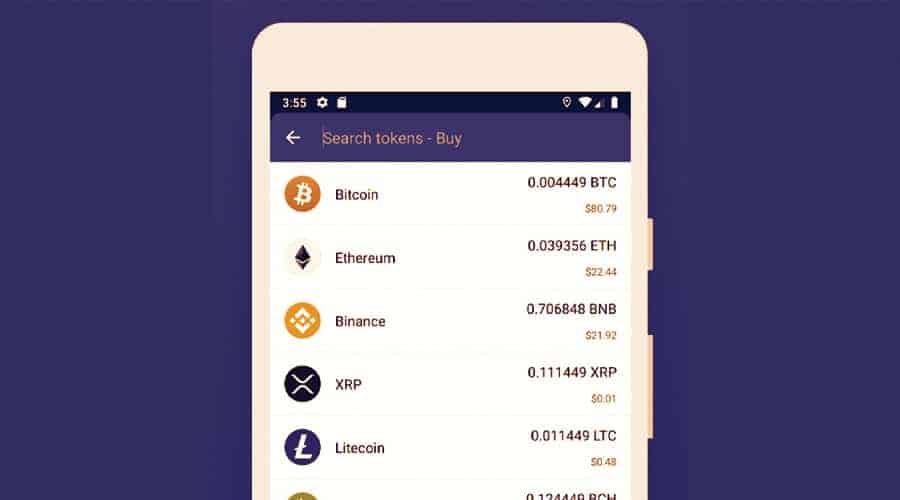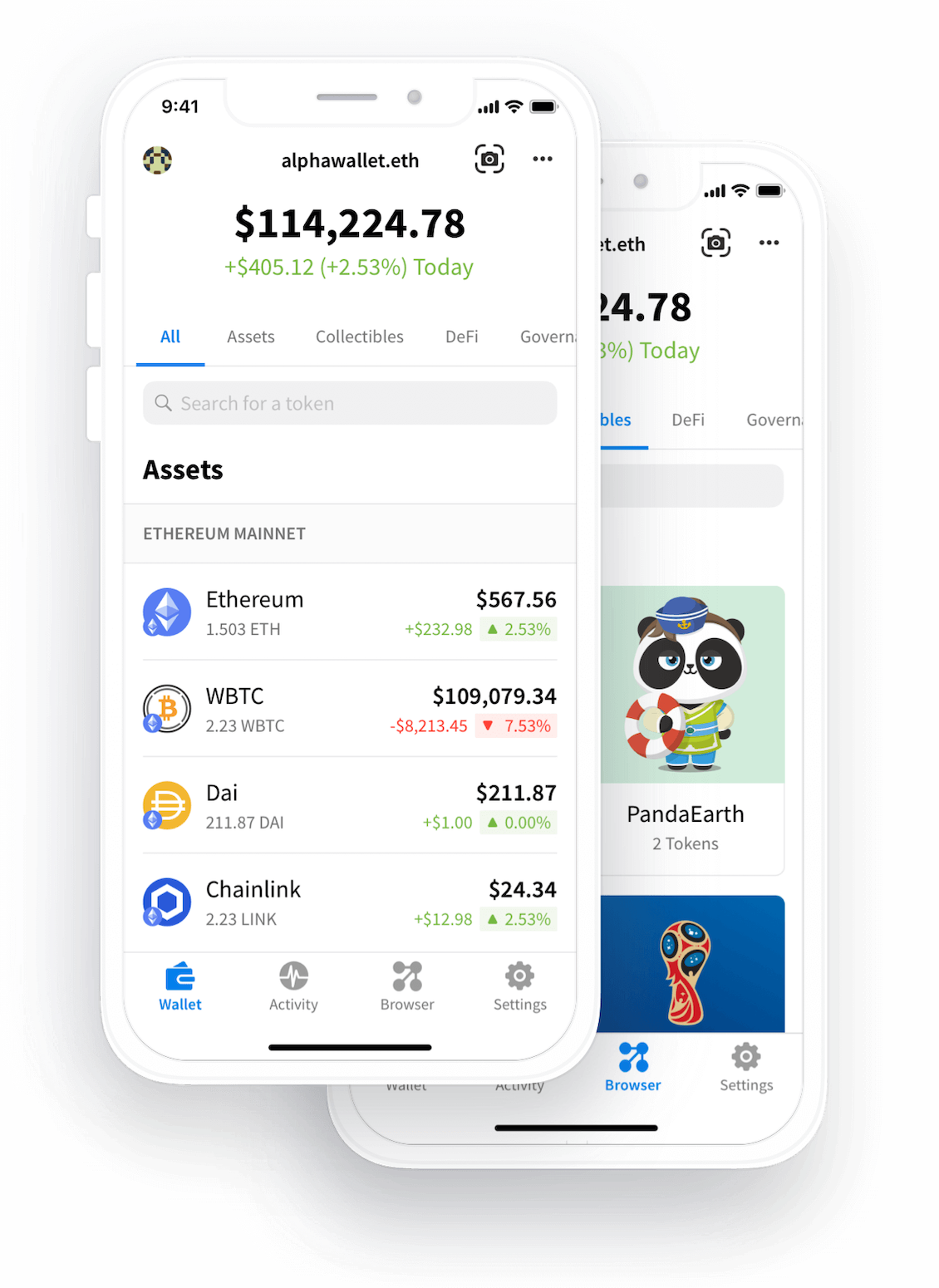When it comes to storing your cryptocurrencies, having a secure and reliable wallet is of utmost importance. With the increasing popularity of Bitcoin and Ethereum, there are now plenty of options available in the market. However, if you’re concerned about the security of your investments, open-source wallets are the way to go.
Open-source wallets are popular among cryptocurrency enthusiasts because their source code is available for anyone to review and audit. This means that the wallets are constantly being scrutinized by the community, making it less likely for any vulnerabilities or backdoors to go unnoticed. Additionally, open-source wallets often have a more user-friendly interface and provide a wider range of features compared to their closed-source counterparts.
One of the top open-source wallets for Bitcoin is Blockstream Green. This wallet is available for both mobile and desktop platforms and offers a range of security features, including multi-signature support and two-factor authentication. With Blockstream Green, you have full control over your private keys, and the wallet is designed to be as secure as possible without compromising on usability.
For Ethereum users, MyEtherWallet is a super popular option. MyEtherWallet is an open-source web-based wallet that allows you to store and manage your Ethereum and ERC-20 tokens securely. The wallet gives you full control over your funds and private keys, and you can access your wallet from any device with an internet connection. MyEtherWallet also has a partnership with several decentralized exchanges, making it easy to trade your cryptocurrencies without having to rely on a centralized exchange.
- What is an open-source crypto wallet?
- Understanding the concept of open-source
- Importance of open-source for crypto wallets
- Do I need an open-source DeFi wallet?
- Benefits of using an open-source DeFi wallet
- Risks and considerations of using an open-source DeFi wallet
- Other ways to store your private keys
- Hardware wallets for enhanced security
- Using custodial wallets for convenience
- Is there an open-source multi-crypto wallet?
- Exploring open-source options for multi-crypto wallets
- Features to consider when choosing an open-source multi-crypto wallet
- Best open source crypto wallets
- Reviewing the top open-source crypto wallets for Bitcoin
- Frequently Asked Questions:
- What are some popular open source crypto wallets for Bitcoin and Ethereum?
- Can you recommend an open source crypto wallet specifically for Bitcoin?
- Are there any open source crypto wallets that support both Bitcoin and Ethereum?
- What are the advantages of using an open source crypto wallet?
- Can you provide more information about MyEtherWallet?
- Video:
- BEST FREE Crypto Wallets! Top 5 Safest Picks!
- The Best Wallet In Crypto (Use This Instead)
- Best Crypto Wallets for Beginners (Crypto Wallet Tutorial)
What is an open-source crypto wallet?

An open-source crypto wallet is a software application that allows individuals to securely store, send, and receive cryptocurrencies such as Bitcoin and Ethereum. The term “open-source” refers to the fact that the software’s source code is freely available to the public, allowing developers to view, modify, and distribute the code. This transparency provides several advantages for users and the broader cryptocurrency community.
Transparency and Security: Open-source crypto wallets allow users to verify the security and integrity of the code, reducing the risk of vulnerabilities or backdoors. This transparency is particularly critical in the cryptocurrency space, where security is paramount.
Community-driven Development: Open-source wallets are often developed and maintained by a community of volunteers or organizations with a shared interest in advancing the technology. This collaborative approach allows for continuous improvements, bug fixes, and the introduction of new features based on community feedback.
Customization and Flexibility: Open-source wallets offer users the ability to customize and tailor the software based on their individual preferences and needs. This flexibility allows users to integrate additional features or services, such as support for specific cryptocurrencies or integration with external platforms.
Reduced Dependence on Third Parties: Open-source wallets provide users with the option to manage their cryptocurrency investments without relying on centralized services or intermediaries. This decentralization aligns with the core principles of cryptocurrencies and empowers individuals to fully control their funds.
Compatibility and Interoperability: Open-source wallets are often compatible with multiple operating systems and can be used across different devices, including desktop computers, smartphones, and hardware wallets. This compatibility facilitates seamless interaction between different wallets, exchanges, and other cryptocurrency services.
Availability and Accessibility: Open-source wallets typically have a wider availability, as they can be freely distributed and downloaded from various sources. This accessibility benefits users who may have specific requirements, such as language support or compatibility with older devices.
In summary, open-source crypto wallets offer a more transparent, customizable, and flexible option for individuals who want to manage their cryptocurrency investments. Whether you’re a super technical user looking to verify the code or a smartphone user wanting a user-friendly interface, there is an open-source wallet out there that suits your particular requirements.
Understanding the concept of open-source

The concept of open-source is becoming more and more popular, especially in the world of cryptocurrency. Open-source refers to software that is freely available for anyone to use, modify, and distribute. It allows developers to have full access to the source code, giving them the ability to customize and improve the software as they see fit.
When it comes to cryptocurrency wallets, open-source wallets are gaining popularity for a number of reasons. One of the main advantages of open-source wallets is transparency. Since the source code is available to everyone, users can review it and ensure that there are no hidden features or malicious code that could compromise the security of their funds.
Open-source wallets also offer more options and flexibility for users. They allow users to choose between different wallets based on their particular needs and preferences. Whether you’re looking for a wallet with a user-friendly interface, advanced features, or a specific integration with a particular cryptocurrency exchange, there are open-source wallets available that can meet your requirements.
Another advantage of open-source wallets is that they often have a community of developers behind them. This means that if you encounter any issues or have any questions, there are people available to help. The community can also contribute to the development and improvement of the wallet, making it a more reliable and robust solution.
Open-source wallets are also great for security-conscious individuals. Since the code is open and transparent, it is easier to identify and fix vulnerabilities. This makes open-source wallets a popular choice for those who want to take full control of their investments and ensure the safety of their cryptocurrency holdings.
Some popular open-source cryptocurrency wallets include Bitcoin Core, Electrum, and Blockstream Green. These wallets offer a range of features and options, allowing users to manage their cryptocurrency investments without relying on a centralized service or third-party provider. They can be used on a computer, smartphone, or even a hardware device, giving users the flexibility to access their funds wherever they are.
In conclusion, open-source wallets provide a fully transparent and customizable option for managing cryptocurrency investments. They allow users to take full control of their funds and ensure their security. With a wide range of open-source wallets available, users are spoiled for choice and can find a wallet that suits their needs perfectly.
Importance of open-source for crypto wallets

When it comes to cryptocurrency wallets, having an open-source option is highly beneficial. Open-source wallets allow users to fully understand and verify their wallet’s functionality without relying solely on a closed-off interface.
One notable example of an open-source wallet is Blockstream Green. This wallet provides a plethora of features, including support for Bitcoin and Liquid assets, as well as a user-friendly interface. By being open-source, users can review the source code and ensure that their funds are secure and well-managed.
Open-source wallets also encourage collaboration and innovation. Developers from all over the world can contribute to the project, making the wallet more robust and secure over time. Additionally, if a particular wallet service fails or becomes obsolete, the open-source nature allows other developers to continue supporting and improving the wallet.
Another advantage of open-source wallets is the transparency they offer. By opening up their source code, users can have more trust in the wallet’s operations, as they can verify that there are no hidden fees or backdoors that could compromise their investments.
Furthermore, open-source wallets are particularly suitable for those who are concerned about the security of their funds. With an open-source wallet, you can be sure that the code has been reviewed by the wider community, reducing the chances of vulnerabilities or malicious code that could put your investments at risk.
Open-source wallets also provide flexibility. You have the freedom to choose between different wallets and find the one that best suits your needs. Whether you prefer a wallet with a user-friendly smartphone interface or one with more advanced features, the open-source community has a wide variety of options to choose from.
In conclusion, open-source crypto wallets offer numerous advantages over closed-source alternatives. They provide transparency, security, flexibility, and the ability to verify the wallet’s functionality. By using open-source wallets, you can take full control of your cryptocurrency investments and have peace of mind knowing that your funds are in trusted hands.
Do I need an open-source DeFi wallet?
If you’re looking for a reliable and secure way to store your cryptocurrencies, you may have come across the term “open-source wallets” in your search. But what exactly are open-source wallets and do you need one for your DeFi transactions?
Open-source wallets are cryptocurrency wallets that are built on open-source software. This means that anyone can view, modify, and distribute the source code of the wallet. The advantage of open-source wallets is that they provide transparency and security, as their code is open to public scrutiny and can be audited by anyone.
While there are plenty of closed-source wallets available, using an open-source wallet for your DeFi transactions can offer several benefits:
- Transparency: Open-source wallets allow you to verify the code and make sure there are no hidden vulnerabilities or backdoors that could compromise the security of your funds.
- Security: With open-source wallets, the community of developers can contribute to the security of the wallet by identifying and fixing any vulnerabilities. This means that the wallet is more likely to be secure and less prone to hacking or other malicious activities.
- Freedom: Open-source wallets give you more control over your funds. You’re not locked into any particular service or exchange and can easily switch to a different wallet without any hassle.
- Customizability: Open-source wallets often come with a variety of options and features that allow you to tailor the wallet to your specific needs. This can be particularly useful if you’re actively participating in DeFi protocols and need more advanced functionality.
- Compatibility: Open-source wallets are usually available on multiple platforms, including desktop, mobile, and web. This means that you can access your funds from anywhere, whether you’re using a computer, smartphone, or tablet.
- Community support: Open-source wallets often have a vibrant and active community of users and developers who can provide support and guidance in case you encounter any issues or have questions about the wallet.
One popular open-source wallet that you might consider for your DeFi transactions is the Blockstream Green wallet. It offers a user-friendly interface, secure storage, and support for both Bitcoin and Ethereum. Additionally, it allows you to easily switch between different cryptocurrencies and offers integration with various DeFi protocols.
In conclusion, while it’s not necessary to use an open-source wallet for your DeFi transactions, it can provide you with additional peace of mind when it comes to the security and transparency of your funds. Additionally, open-source wallets often offer a wide range of features and customization options that can enhance your DeFi experience. So if you’re serious about your DeFi investments, it’s well worth considering an open-source wallet for managing your cryptocurrencies.
Benefits of using an open-source DeFi wallet
Open-source DeFi wallets offer several advantages over traditional closed-source wallets. These wallets, which provide an interface for managing cryptocurrency investments, are built on open-source code that anyone can review and contribute to. Here are some of the benefits of using an open-source DeFi wallet:
- Transparency: Open-source wallets allow users to independently verify the security and functionality of the wallet. This transparency helps build trust and ensures that there are no hidden vulnerabilities or malicious code.
- Security: When using an open-source DeFi wallet, you’re not relying solely on the security measures implemented by a single service or exchange. You have the freedom to audit the code and make any necessary changes to enhance security. Additionally, the open-source community can contribute to identifying and fixing any security issues quickly.
- Flexibility: Open-source wallets grant users the freedom to customize the software according to their needs and preferences. You can modify the interface, add new features, or integrate with other services without relying on a closed-source provider.
- Community-driven development: With open-source DeFi wallets, the development process is typically community-driven. This means that developers from around the world contribute to improving the wallet’s functionality and security. The diverse input helps create a more robust and reliable product.
- Compatibility: Open-source wallets offer compatibility with multiple platforms and operating systems. Whether you’re using a desktop computer, smartphone, or tablet, there are open-source options available for all these devices.
In particular, open-source DeFi wallets like Blockstream Green provide a secure and user-friendly experience for managing your cryptocurrency investments. They offer features such as multi-signature transactions, hardware wallet integration, and advanced privacy options.
Whether you’re a beginner or an experienced cryptocurrency investor, opting for an open-source DeFi wallet can give you peace of mind, knowing that your funds are safe, and you have full control over your assets.
Risks and considerations of using an open-source DeFi wallet
Open-source DeFi wallets offer users a range of benefits, such as transparency, security, and the ability to customize the software to fit their needs. However, there are also risks and considerations associated with using these wallets.
1. Security Risks:
While open-source wallets can be more secure due to the community review process, they are not immune to vulnerabilities. Hackers may exploit these vulnerabilities, potentially leading to loss of funds.
2. Lack of User-Friendly Interface:
Open-source wallets often prioritize functionality over user-friendly interfaces. This can make it more challenging for non-technical users to navigate the wallet and manage their cryptocurrencies effectively.
3. Lack of Official Support:
Open-source wallets are typically developed and maintained by a community of volunteers, which means there may be no official support available. If users encounter any issues or need assistance, they may have to rely on community forums for help.
4. Potential for Misplaced Trust:
While open-source wallets are generally considered more trustworthy due to transparency, it’s essential to be cautious when using third-party sources. Users should ensure they are downloading wallets from reputable sources to avoid downloading fake or malicious software.
5. Compatibility with Exchanges and Services:
Open-source wallets may not always be compatible with all cryptocurrency exchanges and services. Users should check the wallet’s compatibility before making any investments or transactions.
6. Lack of Regular Updates:
Open-source wallets rely on the community for updates and improvements. If the wallet’s developers abandon the project or the community loses interest, the wallet may not receive regular updates. This can lead to potential security vulnerabilities.
7. Limited Features:
Open-source wallets may have limited features compared to commercial wallets. Certain functionalities, such as multi-signature support, asset staking, or integration with other DeFi protocols, may not be available.
Conclusion:
While open-source DeFi wallets offer numerous benefits, users must also consider the risks involved. It’s important to balance the benefits of transparency and customization with potential security vulnerabilities and usability challenges.
Other ways to store your private keys
While using open source crypto wallets is a popular and secure option, there are other ways to store your private keys. Here are a few alternative options:
- Hardware wallets: Hardware wallets are physical devices that store your private keys offline. They are considered to be one of the safest options for storing cryptocurrencies. Some popular hardware wallets include Trezor and Ledger.
- Paper wallets: Paper wallets are physical printouts or written copies of your private keys. These can be stored in a safe or hidden location. Paper wallets provide a cold storage option that is not connected to the internet, making them less vulnerable to hacking.
- Custodial services: Some exchanges and online platforms offer custodial services, where they store your private keys on your behalf. While this can be convenient, it also means that you are trusting the service with your private keys and therefore, control over your funds.
- Multisignature wallets: Multisignature wallets involve multiple parties needing to approve a transaction before it can be executed. This adds an extra layer of security as it requires multiple private keys to sign off on a transaction.
- Blockstream Green: Blockstream Green is a mobile wallet that offers a two-factor authentication and multisignature support. It also has a user-friendly interface and supports both Bitcoin and Liquid Bitcoin. Green is fully open source, allowing users to verify the code and ensure the security of their funds.
It’s important to consider the different options available and choose the one that best fits your needs and level of security. Some users may prefer the convenience of a smartphone wallet, while others may opt for the added security of a hardware wallet or paper wallet. The choice between open source wallets and other storage methods ultimately depends on your personal preferences and the specific cryptocurrency you are looking to store.
Hardware wallets for enhanced security
When it comes to storing your digital assets with maximum security, hardware wallets are the top choice. These wallets offer an extra layer of protection by keeping your private keys offline, making them immune to online threats such as hacking and malware.
Hardware wallets are physical devices that connect to your computer or smartphone, allowing you to securely manage and access your cryptocurrency holdings. With their advanced encryption and security features, hardware wallets ensure that your funds are safe from unauthorized access.
One advantage of hardware wallets is their compatibility with multiple cryptocurrencies. Most hardware wallets support popular cryptocurrencies like Bitcoin and Ethereum, as well as many other altcoins. This means that you can manage all your investments in one place without the need for multiple wallets.
Another great feature of hardware wallets is their user-friendly interface. Many hardware wallets come with a built-in display and buttons, making it easy for you to navigate through menus and confirm transactions. This ensures that even if you’re not tech-savvy, you can still use these wallets without any hassle.
One particular hardware wallet option that has gained popularity in recent years is open-source hardware wallets. Open-source hardware wallets offer an additional level of transparency and security as their source code is publicly available for review. This allows the community to audit the code and identify any potential vulnerabilities, making these wallets even more secure.
Open-source hardware wallets also give you the freedom to modify and customize the software according to your needs. This level of customization is particularly useful for tech enthusiasts who want to have full control over their wallets and tweak them to their liking.
If you’re looking for a super secure option, a fully air-gapped hardware wallet might be the way to go. Air-gapped wallets are completely isolated from internet-connected devices, ensuring that your private keys never come in contact with potentially compromised computers or smartphones.
In conclusion, hardware wallets are a great choice for those who prioritize security and want to store their cryptocurrency investments in a safe and convenient manner. Whether you opt for a standard hardware wallet or an open-source and air-gapped one, you can have peace of mind knowing that your funds are well protected.
Using custodial wallets for convenience

When it comes to managing your cryptocurrencies like Bitcoin and Ethereum, there are several options available to you. While non-custodial wallets like Blockstream Green and Exodus are popular for their security and privacy features, custodial wallets provide a different set of advantages.
A custodial wallet is a type of cryptocurrency wallet where a third party, such as an exchange or a service provider, holds and manages your assets on your behalf. This means that you do not have direct control over your private keys, as the custodian takes care of it for you. However, this also means that you have the convenience of not having to worry about the security and maintenance of your wallet.
One of the key benefits of using a custodial wallet is the ease of use. These wallets often have user-friendly interfaces that make it super easy for anyone, including beginners, to navigate and manage their cryptocurrencies. With a custodial wallet, you can easily view your balance, send and receive funds, and even store additional information related to your investments.
Moreover, custodial wallets usually offer additional features that can be beneficial for users. For example, some custodial wallets allow you to exchange between different cryptocurrencies directly within the wallet, saving you the hassle of using an external exchange. This can be a time-saving option if you frequently trade or diversify your cryptocurrency holdings.
Another advantage of using custodial wallets is the ability to access your funds from multiple devices. Many custodial wallets offer mobile applications, allowing you to manage your cryptocurrencies on the go. This means that you can easily check your balance, make transactions, and monitor the market without being tied to a computer.
One particular custodial wallet that is well-known in the cryptocurrency community is Coinbase. Coinbase offers a fully custodial wallet service, providing users with a simple and secure way to buy, sell, and store cryptocurrencies. They also have a user-friendly mobile app, making it convenient to manage your cryptocurrencies from your smartphone.
It’s important to note that while custodial wallets offer convenience, they may not be suitable for everyone. If you value absolute control over your private keys and prefer to have full ownership of your cryptocurrencies, then custodial wallets may not be the best option for you. However, if you’re looking for a hassle-free way to manage your funds and are willing to trust a third party to handle your assets, custodial wallets can be a great choice.
In conclusion, using custodial wallets can provide convenience and ease of use for individuals who want a simple way to manage their cryptocurrencies. While it may not be the best option for everyone, custodial wallets offer a range of features that make it easier for users to access, trade, and store their cryptocurrencies without the need for extensive technical knowledge or security measures.
Is there an open-source multi-crypto wallet?
Yes, there are several open-source multi-crypto wallets available that allow you to store and manage multiple cryptocurrencies in one place.
If you have investments in different cryptocurrencies and are looking for a convenient option to manage them, an open-source multi-crypto wallet can be a great choice. These wallets provide you with the flexibility to hold, send, and receive a variety of cryptocurrencies without the need to use multiple wallets or exchange services.
With an open-source multi-crypto wallet, you can have control over your private keys and securely store your cryptocurrencies on your smartphone or computer. These wallets also often offer features like built-in exchange services, where you can quickly and easily trade between different cryptocurrencies without relying on external exchanges.
One super popular open-source multi-crypto wallet is the Blockstream Green Wallet. This wallet supports Bitcoin and Ethereum, as well as a range of other cryptocurrencies. It has a user-friendly interface and provides advanced features like two-factor authentication and hardware wallet support.
Another well-known open-source multi-crypto wallet is Exodus. This wallet supports a wide range of cryptocurrencies and allows you to manage your investments easily. It has a simple and intuitive interface, making it suitable for beginners as well as more experienced cryptocurrency users.
These are just a couple of examples, and there are many more open-source multi-crypto wallets available. They provide a great option for users who want to manage their diverse cryptocurrency investments without relying on centralized sources or third-party exchanges.
- Open-source multi-crypto wallets give you control over your private keys and allow you to securely store multiple cryptocurrencies.
- They often offer built-in exchange services, enabling you to easily trade between different cryptocurrencies without relying on external exchanges.
- Some popular open-source multi-crypto wallets include Blockstream Green Wallet and Exodus, which provide user-friendly interfaces and advanced features.
- These wallets are suitable for both beginners and experienced cryptocurrency users.
Exploring open-source options for multi-crypto wallets
When it comes to managing your cryptocurrencies, having an open-source wallet is essential. Open-source wallets are favored by many crypto enthusiasts for their transparent and secure nature. In this article, we will explore some of the top open-source multi-crypto wallets that are well-regarded in the community.
Blockstream Green Wallet:
The Blockstream Green Wallet is a fully open-source wallet that supports both Bitcoin and Liquid Bitcoin (L-BTC). Its intuitive interface makes it easy to use for both new and experienced users. With Blockstream Green Wallet, you can have full control over your private keys without relying on any third-party service.
MyEtherWallet:
If you’re looking for an open-source option for Ethereum and ERC-20 tokens, MyEtherWallet is a popular choice. It allows you to interact directly with the Ethereum blockchain and provides a secure and user-friendly interface. With MyEtherWallet, you can easily manage your Ethereum-based assets without the need for an exchange.
Trust Wallet:
Trust Wallet is an open-source mobile wallet that supports various cryptocurrencies, including Bitcoin and Ethereum. It allows you to store your assets securely on your smartphone and gives you full control over your private keys. Trust Wallet also supports dApps, allowing you to enjoy a seamless experience within the cryptocurrency ecosystem.
Exodus:
Exodus is another popular open-source wallet that supports multiple cryptocurrencies. It offers a user-friendly interface and provides a built-in exchange service, allowing you to easily swap your assets between different cryptocurrencies. With Exodus, you can have full control over your funds while enjoying a super intuitive and aesthetically pleasing interface.
When it comes to storing cryptocurrencies, having an open-source wallet gives you the assurance that the underlying code has been thoroughly audited by the community. Open-source wallets provide a higher level of security and transparency, making them a preferred option for many cryptocurrency enthusiasts. So, if you’re looking to manage multiple cryptocurrencies without compromising security, opting for an open-source wallet is a smart choice.
Features to consider when choosing an open-source multi-crypto wallet
When choosing an open-source multi-crypto wallet, there are several important features to consider. These features can help you make an informed decision and find a wallet that suits your specific needs and preferences.
1. User-friendly interface: Look for a wallet that offers a user-friendly interface. This will make it easier for you to navigate and use the wallet’s features without any hassles.
2. Multi-currency support: Ensure that the wallet supports multiple cryptocurrencies. This will allow you to manage all your different investments in one place.
3. Open-source: Opt for a wallet that is open-source. This means that the source code of the wallet is publicly available, which provides transparency and allows you to verify the wallet’s security and trustworthiness.
4. Integration with exchanges: Check if the wallet offers integration with popular cryptocurrency exchanges. This feature will allow you to easily trade and exchange your cryptocurrencies without the need to switch between different platforms.
5. Security features: Look for wallets that offer robust security features such as two-factor authentication, encryption, and secure storage of private keys. These features will ensure the safety of your funds.
6. Availability on multiple platforms: Consider wallets that are available on different platforms such as web, desktop, and mobile devices. This will give you the flexibility to access and manage your funds from anywhere.
7. Community support: Look for wallets that have an active and supportive community. This can provide you with additional resources, tutorials, and help in case you encounter any issues with your wallet.
8. Regular updates: Check if the wallet is regularly updated. Regular updates indicate that the developers are actively maintaining and improving the wallet, ensuring its compatibility with the latest security protocols and features.
9. Compatibility with hardware wallets: If you own a hardware wallet, ensure that the multi-crypto wallet is compatible with it. This will provide an additional layer of security for your cryptocurrencies.
10. Ease of use: Consider wallets that are easy to set up and use. Look for intuitive interfaces and clear instructions that will allow you to manage your cryptocurrency investments effectively, even if you are new to the crypto world.
| Wallet | User-friendly interface | Multi-currency support | Open-source | Integration with exchanges | Security features | Availability on multiple platforms | Community support | Regular updates | Compatibility with hardware wallets | Ease of use |
|---|---|---|---|---|---|---|---|---|---|---|
| Wallet A | Yes | Yes | Yes | No | Yes | Yes | No | Yes | No | Yes |
| Wallet B | Yes | Yes | Yes | Yes | Yes | Yes | Yes | Yes | Yes | Yes |
| Wallet C | Yes | Yes | Yes | Yes | Yes | Yes | Yes | Yes | No | Yes |
By considering these features and comparing them among different open-source multi-crypto wallets, you can find a wallet that meets your requirements and provides a secure and convenient way to manage your cryptocurrency investments.
Best open source crypto wallets

When it comes to storing and managing your cryptocurrency investments, it’s important to choose a reliable and secure wallet. Open-source crypto wallets offer a transparent and trustworthy option, allowing you to take full control of your funds without relying on third-party services.
One popular open-source crypto wallet is Blockstream Green. This wallet is available for both Bitcoin and Ethereum, and it offers a range of features that make it easy to manage your funds. Blockstream Green allows you to store your private keys securely on your smartphone, ensuring that you have full control over your assets.
Another option for open-source crypto wallets is the Exodus wallet. Exodus supports a wide range of cryptocurrencies, including Bitcoin and Ethereum. It has a user-friendly interface that makes it easy to send, receive, and exchange your cryptocurrencies. With Exodus, you can also track the value of your holdings and view detailed transaction history.
If you’re looking for a fully open-source wallet, you might consider the Electrum wallet. Electrum is a lightweight and secure wallet that allows you to store your private keys on your own computer. It is compatible with both Bitcoin and Ethereum, and it offers a range of advanced features for more experienced users.
For those who prefer a hardware wallet, Trezor is a great option. Trezor is an open-source hardware wallet that allows you to store your private keys offline, adding an extra layer of security to your funds. It supports a wide range of cryptocurrencies and offers a simple and intuitive interface.
When choosing an open-source crypto wallet, it’s important to consider your particular needs and preferences. Some wallets may offer more advanced features, while others may prioritize ease of use. Additionally, it’s important to ensure that the wallet you choose is compatible with the cryptocurrencies you want to store.
- Blockstream Green
- Exodus
- Electrum
- Trezor
By using open-source wallets, you can have peace of mind knowing that your cryptocurrency investments are securely stored and managed. Whether you’re a beginner or an experienced trader, these wallets provide a reliable and transparent option for managing your digital assets.
Reviewing the top open-source crypto wallets for Bitcoin
When it comes to storing your Bitcoin, having a secure and reliable wallet is crucial. Open-source crypto wallets provide an excellent option for users who value transparency and want to take control of their cryptocurrency investments. In this article, we will review some of the top open-source crypto wallets for Bitcoin.
One popular open-source wallet is Blockstream Green. This wallet offers a user-friendly interface and allows you to store, send, and receive Bitcoin without relying on a third-party service. It also provides support for hardware wallets, which adds an extra layer of security to your funds.
If you’re looking for more flexibility, you might consider Electrum. This wallet is known for its lightweight design and fast performance. It allows you to choose your server, making it possible to use your own full node. Electrum also offers support for hardware wallets and provides advanced options for more experienced users.
For smartphone users, there are several open-source wallet options available. BlueWallet is a popular choice, offering a simple and intuitive interface. It supports Bitcoin and Lightning Network payments, making it super convenient for users who want to transact quickly and easily.
If you use multiple cryptocurrencies, Exodus might be the wallet for you. While it is not fully open-source, it supports a wide range of cryptocurrencies, including Bitcoin. Exodus also provides a built-in exchange service, allowing you to trade between different cryptocurrencies without leaving the wallet.
When it comes to security and privacy, Samourai Wallet is a top choice. It is focused on providing users with the highest level of anonymity and privacy. Samourai Wallet also offers advanced features like coin control and you have full control over your private keys.
Overall, open-source crypto wallets offer a great way to take full control over your Bitcoin investments. They provide transparency, security, and flexibility, allowing you to manage your funds without relying on third-party services. Whether you’re a beginner or an experienced cryptocurrency user, there is a particular open-source wallet that can meet your needs.
Frequently Asked Questions:
What are some popular open source crypto wallets for Bitcoin and Ethereum?
Some popular open source crypto wallets for Bitcoin and Ethereum are: MyEtherWallet, Electrum, Exodus, Jaxx, and Coinomi.
Can you recommend an open source crypto wallet specifically for Bitcoin?
Yes, one of the best open source crypto wallets for Bitcoin is Electrum. It is widely used and highly regarded for its security and features.
Are there any open source crypto wallets that support both Bitcoin and Ethereum?
Yes, there are several open source crypto wallets that support both Bitcoin and Ethereum. Some popular options include Exodus, Jaxx, and Coinomi.
What are the advantages of using an open source crypto wallet?
Using an open source crypto wallet has several advantages. Firstly, the code of the wallet is open and auditable, which means that potential security vulnerabilities can be identified and fixed by the community. Secondly, open source wallets often have a strong community support, with active developers and frequent updates. Lastly, open source crypto wallets allow users to maintain control over their private keys, enhancing the security and privacy of their funds.
Can you provide more information about MyEtherWallet?
MyEtherWallet is an open source crypto wallet specifically designed for Ethereum and ERC-20 tokens. It allows users to generate and manage Ethereum wallets, as well as interact with smart contracts and decentralized applications. MyEtherWallet is known for its simplicity and user-friendly interface, making it a popular choice among Ethereum users.
Video:
BEST FREE Crypto Wallets! Top 5 Safest Picks!
The Best Wallet In Crypto (Use This Instead)
Best Crypto Wallets for Beginners (Crypto Wallet Tutorial)








